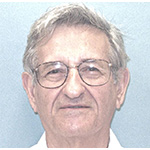
Professor Emeritus Murray Wachman passed away on September 29, 2021, after a serious illness of several weeks duration. His funeral was held on October 1 at 9 a.m. at the Weinstein Mortuary at 640 Farmington Avenue in Hartford. He was 90 years old.
Murray was born on February 1, 1931 in Tel Aviv which then lay in the (League of Nations) Mandate of Palestine administered by Great Britain. In 1941, his family moved to Brooklyn, New York. As an undergrad, he studied at Brooklyn College where he received his B.A. in 1953. Like most American men of that era, he served in the Army from 1953 till 1955.
Murray did his graduate work at the Mathematics Institute of New York University. The Institute had a defining presence in American applied mathematics and welcomed many refugee mathematicians before and after the Second World War. It was renamed for its founder and is now called the Courant Institute of the Mathematical Sciences.
His masters degree was granted in 1956. He then worked as a mathematical analyst and programmer at Republic Aircraft from 1957 to 1959 and, from 1959 to 1967, as a group leader in the General Electric Space Science Laboratory. Those industrial jobs overlapped with his doctoral study.
Murray received his doctorate in 1961. His doctoral supervisor was Fritz John who had been a student of Courant in Göttingen. Murray’s research there concerned the isolated non-removable (essential) singularities of linear elliptic partial differential equations (PDEs). He then moved to applications in celestial mechanics, gas mechanics and, later, biological systems. Along the way, he worked on numeric solutions of PDEs and generalized series solutions of elliptic PDEs in finite dimensions. He described his area of interest as generalized complex variables.
At UConn, Murray played a key role in introducing applied mathematics as a significant research area in the mathematics department. He supervised the graduate program during the period when doctoral study matured from one producing an occasional graduate to one much like the one we now have. He recognized the opportunity provided by the influx, into American academia, of students from China whose studies had been interrupted by the Cultural Revolution; that period is often dated as occurring from 1966 till 1976.
Murray was a warm, caring colleague and friend. He will be missed by those of us who were fortunate enough to know him.